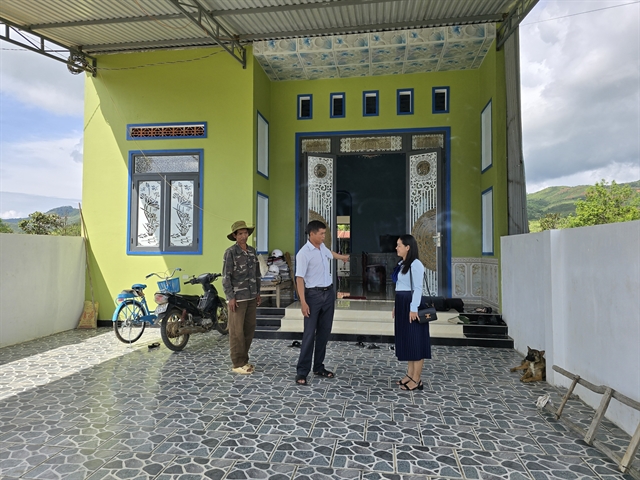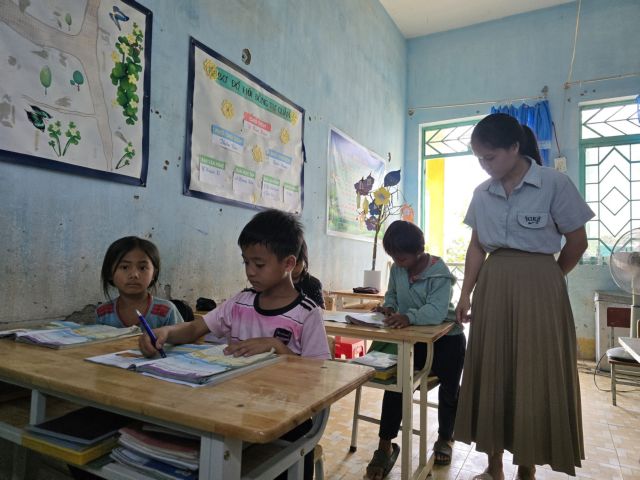A fresh start: Ethnic Laotians thriving as Vietnamese nationals
Society – Economy - Ngày đăng : 08:27, 04/01/2025
 |
| A newly built, spacious house of an ethnic Laotian family in Măng Rao Village, Đăk Glei District. VNA/VNS Photo |
Kon Tum Province, which shares over 290km of border with Laos and Cambodia, has witnessed a remarkable demographic change. Following the policies of the Vietnamese Government, many Laotian residents in the border areas of Central Highlands province have been granted Vietnamese nationality.
Lives of transience
Before 1987, a number of Laotian residents near the border with Đăk Glei District (Kon Tum) lived a transient life due to a lack of nationality.
A Đào, 67, a resident of Măng Rao Village, Đăk Pék Commune, Đăk Glei District, said that many years ago hundreds of Laotians, driven by failed harvests in their country, crossed the border into Việt Nam searching for arable land to settle on. At that time, borders held little meaning for those people, who adhered to traditional practices of nomadic cultivation.
Living without electricity, roads, schools, healthcare, clean water, or access to local economic support policies made the illegal migrants' life extremely challenging.
“We had no identification documents, no records and no personal papers. Our children couldn’t attend school, and we had no access to public medical care. All we had was a temporary residence permit issued jointly by the border authorities of Việt Nam and Laos,” said Đào.
Some individuals endured precarious lives in the forests, relying on hunting, foraging, and drinking from streams, living a life reminiscent of earlier eras. Their isolation meant living in constant fear of wild animals and natural disasters, cut off from news or contact with the outside world for long periods.
The most difficult times came during illness, with villagers enduring a gruelling one-or-two-day trek to carry the sick to the district health centre in Đăk Glei. After countless life-and-death moments, the Laotian migrants yearned for the stability and recognition of nationality to escape from their desperate and transient existence.
Local authorities in Kon Tum have since 2017 intensified efforts to raise awareness about unauthorised migration and unregistered marriages in border areas. They have distributed leaflets and collaborated with central and provincial agencies to process applications for the President’s approval, granting nationality to stateless migrants. This has facilitated the issuance of birth certificates, household registration books, and ID cards in accordance with the Vietnamese law.
Turning a new page
Since 2009more than 1,000 ethnic Laotians in Kon Tum have been granted Vietnamese nationality by the President. Most reside in border communes in Ngọc Hồi and Đăk Glei districts. To support their stable residence, local authorities have ensured the issuance of birth certificates, household registration books, and ID cards, enabling full citizenship rights. School-aged children now attend school, and families receive support for education and economic development.
“When we were granted Vietnamese nationality in 2012, our joy was indescribable,” said A Diệt, secretary of the Măng Rao Village Party Committee.
“Our children were officially registered, and we received household registration books. The State invested in electricity, roads, schools, and healthcare centres. Many families received loans to raise livestock and grow crops, lifting them out of poverty. Thanks to these changes, the community is increasingly optimistic and deeply trusts the leadership of the Party and the State.”
 |
| Naturalised Laotian Vietnamese children in Kon Tum Province attend school and benefit from support and assistance from the government. VNA/VNS Photo |
For elderly A Chang of Măng Rao Village, the privilege of voting for the first time was profound. “Holding the ballot in my hand was a sacred and proud moment. It made us feel grateful to the government,” he said.
The border areas of Kon Tum are home to 25 ethnic groups with nearly 61,600 members. Ethnic minorities make up over 77 per cent of the population, residing in 99 hamlets and villages across 13 communes in the four border districts of Đăk Glei, Ngọc Hồi, Sa Thầy, and Ia H’Drai.
Ngọc Hồi and Đăk Glei district authorities have directed border communes to allocate land, provide seeds and breeding livestock, and offer technical guidance for economic development. Households also have access to low-interest loans from the Social Policy Bank to build homes, fostering a strong connection to their new homeland.
Y Điết, a resident of Đăk Mế Village in Pờ Y Commune, said that after acquiring nationality in 2017, her family received coffee seedlings and breeding cattle. With guidance from officials on husbandry techniques, her family now earns nearly VNĐ100 million (nearly US$4,000) annually, significantly improving their quality of life.
According to Tống Văn Đồng, chairman of the Pờ Y Commune People’s Committee [administration], the commune currently has 12 naturalised citizens, all of whom have received comprehensive support from local authorities.
“With this assistance, they have quickly integrated into life in Việt Nam and feel secure in their livelihood. We will continue integrating national target programmes to help these ethnic Laotian households achieve sustainable poverty alleviation,” he said.
Y Lan, vice chairwoman of the Ngọc Hồi District People’s Committee, said that naturalised families had united with other local ethnic groups, overcoming challenges, fostering solidarity, and actively participating in patriotic movements. These ethnic Laotians preserved their cultural traditions while maintaining cross-border family ties, acting as vital “bridges” in fostering the traditional friendship between Việt Nam and Laos, and contributing to a peaceful and prosperous border region.
Granted Vietnamese nationality, these former Laotian migrants have embraced a brighter chapter in life. With improved living conditions and secure futures, they abide by the law, unite with other communities to build a new, prosperous homeland, and serve as pivotal “nuclei” in strengthening the friendship, solidarity, and comprehensive cooperation between Việt Nam and Laos. VNS
